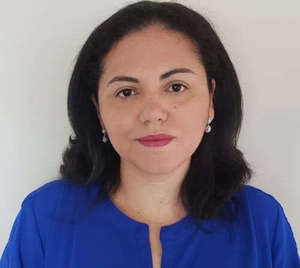 "
"
Starting her Notre Dame journey as a visiting fellow for the Kellogg Institute, Abby Córdova officially joined the Notre Dame faculty in 2019 as an assistant professor for the Keough School of Global Affairs. Córdova specializes in the subject of comparative politics in Latin America and is currently teaching a university seminar on global criminal governance and a graduate-level class on research methodology. She is also the co-principal investigator at Notre Dame’s lab for violence and transitional justice.
What originally piqued your interest in comparative politics, violence and criminal governance?
I grew up in El Salvador in the middle of a civil war that lasted over 10 years, and growing up in that context made me think about why we see wars starting. I questioned the causes of this violence, which I saw to be economic inequality, so in high school, I decided I wanted to study and research economics and economic inequality. I hoped to become a professor, and I ended up graduating early from Universidad Centroamericana José Simeón Cañas, where I started teaching as a full-time faculty member for the economics department. While teaching economics, I applied for a Fulbright Scholarship and was selected to earn my master’s in economic development at Vanderbilt. Once there, I started to realize that we cannot understand human development if we don't look at the political dimension of poverty and economic inequality. I went on to apply to a doctoral program in political science at Vanderbilt and continue my studies on economic inequality and its relation to violence.
What research have you been conducting since becoming the co-principal investigator for the violence and transitional justice lab?
Professor Guillermo Trejo started the lab to bring together faculty, students and practitioners that are interested in issues of violence and transitional justice to research and to think about how our research can be used to advocate for human rights in different Latin American countries. We have meetings every two weeks with our groups, which include students, where we discuss our findings and our research ideas. Beyond sharing scholarly work, we also explain how we plan to promote justice for the victims of this violence. My research focuses on the intersection of criminal violence and gender-based violence in Central American countries. I'm interested in examining how women living in communities with high levels of criminal violence go about their daily life and how they cope with the different types of violence that they suffer, particularly sexual violence. I am also researching how these dynamics shape women's possibility to exercise their political rights and manage civic participation.
How do you feel about the political climate on campus, especially with regards to female participation in government and other leadership positions?
Last semester I taught a capstone course for seniors where most of the students were female, and I was extremely impressed by their leadership. Female students at Notre Dame are bright leaders making a change and promoting the activism of other female students on campus. Both in the Notre Dame context with students and faculty, but also in the world, we have seen a change where women are demanding the right to have leadership roles. This struggle hasn't been easy. We have made progress, but it is still not enough. In particular, we need more change and progress when it comes to promoting the work and leadership of women of color. I'm glad to be part of the Notre Dame family working with so many wonderful women and men, so while I think gender inequalities still exist in all settings, it has been rewarding to see new generations mobilizing to generate change geared toward equality.